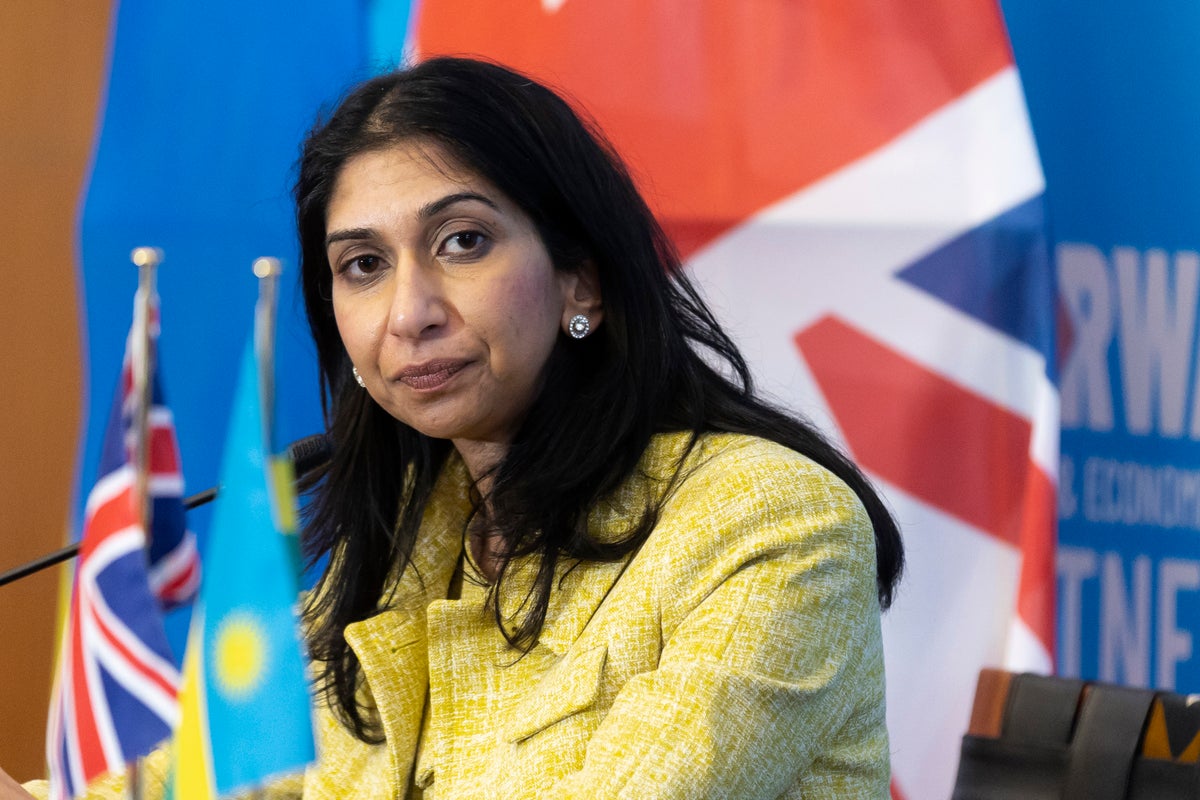
Suella Braverman has been granted permission to fight a ruling that the Rwanda migration deal is unlawful at the Supreme Court.
Ministers have continued to back the policy despite the Court of Appeal finding that the country was not safe to receive asylum seekers forcibly deported from the UK.
The home secretary said she “respectfully disagrees” with the judgment, and the government claims it will make “robust arguments” in defence of the £140m deal with Rwanda.
Its new small boats bill, which is currently the subject of a stand-off between MPs and peers, relies on the Rwanda deal to achieve its aim of detaining and removing small boat migrants – although the High Court heard it only has the capacity to take a small portion of them.
The law is likely to be passed by parliament this week, but the Supreme Court will not be able to decide the Rwanda case for months.
An order published by the Court of Appeal said it had found there were “substantial grounds for believing that the removal of asylum seekers to Rwanda exposed them to a real risk of ill-treatment” by being transferred to countries where they were at risk, and violated the European Convention on Human Rights.
It confirmed that any removals under the deal remain unlawful unless the ruling is overturned, but added: “Permission is granted to the [home secretary] to appeal to the Supreme Court.”
Ms Braverman welcomed the decision and defended “robust assurances” given by the Rwandan government that asylum seekers from the UK would be offered a safe and fair process.
“I absolutely believe this policy is lawful and both the High Court and Court of Appeal have been unanimously clear that relocating asylum seekers to a safe third country can be done in line with the Refugee Convention,” she added.
Rishi Sunak’s asylum accommodation strategy is also mired in legal challenges, with three councils in the High Court on Thursday arguing plans to use military bases and a former prison are unlawful.
Despite the ongoing legal battle, the Home Office moved the first group of asylum seekers into former RAF Wethersfield in Essex yesterday.
Suella Braverman extended the Rwanda deal to cover modern slavery victims in March— (PA)
The prime minister has made one of his five key pledges to the British public “stopping the boats”, but crossings have rocketed in recent weeks, bringing figures close to the records seen in 2022.
When the Rwanda deal was struck last April, ministers claimed it would “deter” asylum seekers from using small boats, but a parliamentary report found there was “no clear evidence” for the assertion.
The Court of Appeal’s 161-page ruling said Rwanda was not safe for the purpose of receiving asylum seekers, and that ministers were wrong to rely on unevidenced assurances that “seriously deficient” processes would be improved.
A judge said the Home Office had ignored “the past and the present situation”, and failed to probe the disappearance and death of migrants sent to Rwanda under a previous deal with Israel.
The court said the government had responded to damning evidence from the UN Refugee Agency (UNHCR) with “not very satisfactory” statements that were “dependent on information supplied by the government of Rwanda” itself.
The Lord Chief Justice concluded: “Unless and until the deficiencies in its asylum processes are corrected, removal of asylum seekers to Rwanda will be unlawful.”
He said the decision implied “no view whatever about the political merits or otherwise of the Rwanda policy”, which has already seen Kigali paid £140m and the government spend more than £1m on legal costs.
No flights can take off unless the government wins the case, sparking calls for the government to put the new Illegal Migration Bill on hold until it can be implemented.
Ms Braverman extended the Rwanda deal to fit the terms of the bill during a visit to Rwanda in March, broadening it beyond asylum seekers to include modern slavery victims and other small boat migrants.
But the Court of Appeal said evidence showed that “the physical capacity for housing asylum seekers in Rwanda was limited to 100”, and that Kigali has “complete control” over who goes and the power to “reject any proposed name”.







